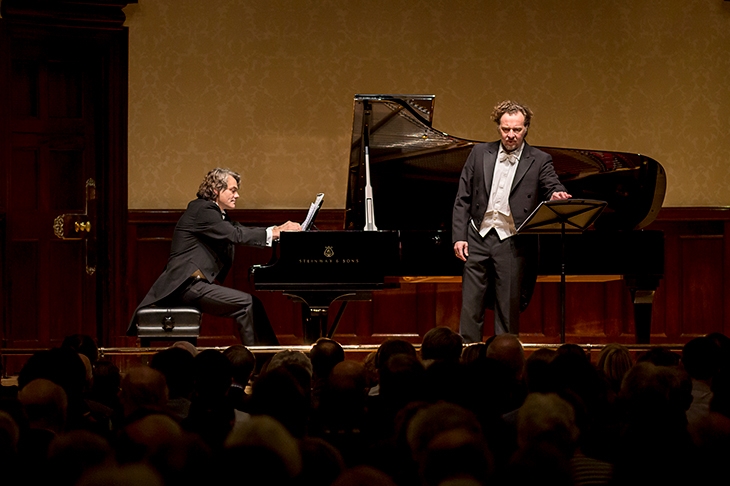‘Popular’ classical music is a relative term. Show me someone who thinks Beethoven is surefire box office, and I’ll show you someone who’s never tried to sell tickets for the Op. 9 string trios. Even Mahler, the blockbuster concert phenomenon of the past four decades, has his limits. Audiences love him, sure. But in 2011, when several orchestras performed complete Mahler cycles, the limits of that love became embarrassingly clear. The Second and Eighth symphonies — roof-raising choral spectaculars — promptly sold out. The gentle Fourth and the knotty, reconstructed Tenth: not so much. As for his songs, forget it.
Well, that’s lieder for you. For most Anglophone music lovers, the entry barriers to the world of German song — a near-native understanding of Schiller, Goethe and Heine, just for starters — can feel impossibly high. (For some reason, any suggestion that lieder recitals should have surtitles still provokes massed handbag-clutching.) It’s not a wholly closed world. It’s possible to recognise a great song or a great performance while still being intensely aware that you’re missing something vital. But essentially you’re outside looking in, and without a lot more work on your classroom German, that’s where you’re going to stay.
Gerhaher’s sensitivity was so poignant it gave even a non-native speaker some intimation of the music’s soul
The Wigmore Hall is different; but then, Wigmore audiences are, shall we say, unusual. So what to report about Christian Gerhaher and Gerold Huber’s Mahler recital? It was sold out, of course. The programme was curious: the five Rückert-Lieder plus a handful of songs from Des Knaben Wunderhorn, prefaced by part of Das Lied von der Erde, and rounded off with the long final song from the same work, ‘Der Abschied’. Compared with the orchestral version, it felt curiously abstract, for all the subtlety of Huber’s piano playing and Gerhaher’s heartbreakingly tender phrasing. Michael Downes’s excellent programme notes cited evidence that Mahler intended Das Lied to be performed in a piano version, but programme-note writers are counsel for the defence, and Mahler’s jangly keyboard tremolandos didn’t quite convince.
In the Rückert-Lieder, though, Gerhaher sang with a sensitivity that was so poignant, so self-denying, and so completely subordinate to Mahler’s vision that it gave even a non-native speaker some intimation of the music’s soul. He can blaze, when he wants to. But generally, he didn’t, responding to individual words, images and even syllables with endlessly varied vocal colouring. His voice slipped plangently down into silence, vibrato-free, on the final line of each verse of ‘Liebst du um Schönheit’. The colour blanched from his tone and a catch in his throat became audible on the word ‘Schmerzens’ (pain) in the central song ‘Um Mitternacht’. Only three or four times in the whole evening, when the narrative and the image demanded it, did he let fly with a burning, ringing fortissimo that grabbed you around the heart and administered a sharp, short squeeze.
This was vocal chamber music on the highest level. Huber opened ‘Ich atmet’ einen linden Duft’ with a glistening little spray of keyboard brilliance. Two verses later, in the final line, Gerhaher gave a matching surge on the word ‘Liebe’, musical form, poetic meaning and the dialogue between the two artists all converging in a single instant of connection. With some lieder singers this degree of detail can seem mannered. As Gerhaher and Huber gently shaped the final bars of ‘Ich bin der Welt abhanden gekommen’ — possibly Mahler’s loveliest single song — it didn’t feel that way at all. A final point to report: quite a few audience members appeared to be in tears.
Still, it was a relief to rejoin Marcello, Rodolfo and the gang for (according to the programme) the Royal Opera’s 653rd performance of La bohème. Richard Jones’s staging first appeared in 2017, replacing what’s usually described as a ‘much-loved’ 1970s production — ‘much-loved’ being critic speak for literal and drably lit. Jones pares things back and roughens them up. The boys’ garret looks genuinely chilly, and the banter between the flatmates has a boisterous, borderline aggressive edge that makes them wholly believable as young men in their twenties.
Puccini provides all the necessary warmth, and with this cast, plus vivid, affectionate conducting from Emmanuel Villaume, that’s ample. There was a satisfying tang of testosterone to Charles Castronovo’s singing as Rodolfo; Aida Garifullina was a feline Musetta and Sonya Yoncheva, as Mimi, had a touching sweetness that was heightened — even in the wrenching final scene — by her air of slight reserve. None of these young people really knows how to handle love, let alone death. But Jones knows how to put on a show. With the chocolate-box spectacle of Act Two’s Parisian arcades, and comic details like Colline’s disappearing hair and Marcello’s scuttling escape beneath the tables of Café Momus, Jones’s production does pretty much everything you could want from a Bohème. Revived this well, I reckon it’s good for a few years yet.






Comments